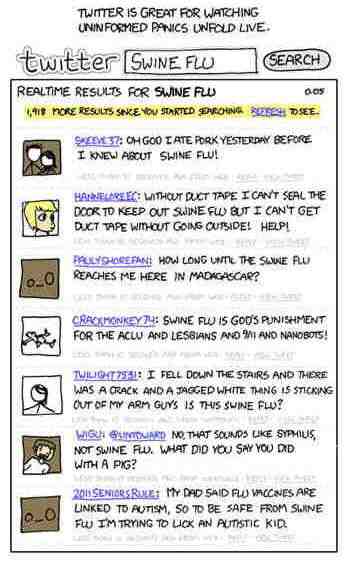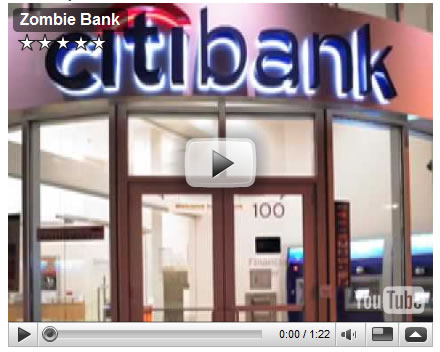Pig Scores Bull Out of the Stock Market
Stock-Markets / Financial Markets 2009 Apr 28, 2009 - 04:19 AM GMTBy: PaddyPowerTrader
 Despite the tabloid-like hysteria about swine flu, stocks held up reasonably well yesterday. Investors did dump the usual suspects, i.e. airline, travel, hotel and cruise stocks. GM also announced that it will slash 21k jobs and axe 40% of dealerships (shares closed up 21%). Financials were also a drag, on renewed worries that the government’s pending stress test results will force regional backs in particular to raise fresh capital. Pharma and health-care stocks were, of course, higher.
Despite the tabloid-like hysteria about swine flu, stocks held up reasonably well yesterday. Investors did dump the usual suspects, i.e. airline, travel, hotel and cruise stocks. GM also announced that it will slash 21k jobs and axe 40% of dealerships (shares closed up 21%). Financials were also a drag, on renewed worries that the government’s pending stress test results will force regional backs in particular to raise fresh capital. Pharma and health-care stocks were, of course, higher.
Today’s Market Moving Stories
 Japanese March retail sales fell 3.9% yoy vs -5.7% in February. South Korea’s consumer confidence index rose sharply in April to 98 from 84 the prior month.
Japanese March retail sales fell 3.9% yoy vs -5.7% in February. South Korea’s consumer confidence index rose sharply in April to 98 from 84 the prior month.
- In a microcosm of current trends, Deutsche Bank reported a, on the face of it, very impressive net profit of €1.2bn in Q1 2009. But the bears will argue the company is highly leveraged, is exposed to risky assets and the results are not sustainable. The bulls will argue the revenues are sustainable and Deutsche is a ‘winner’ from the crisis and will clean up as weaker rivals retreat. However, the extent of the revenue in Fixed Income (€3.8bn) vs Equities (€275mln) is quite worrying and is a very poor business mix. Like all Investment Banks that have printed large Q1 Fixed Income numbers it is not entirely clear how they have made the money and therefore, to extrapolate even a percentage of those earnings for the rest of the year is difficult to do.
- ECB council member Nowotny said the ECB will keep rates low for “as long a time as is required” and officials “stand ready to use unconventional measures of quantitative easing”. This is the latest in a series of comments hinting that the ECB are finally and belatedly moving towards thoughts of QE. Note the next Council meeting on Thursday May 7th at which they are expected to cut rates by 0.25%
- The World Steel Association sees a fall in US steel demand of more than 36% this year; EU demand will fall nearly 30%; global is down just 15%. That is still far more pessimistic than the 10% fall in demand for 2009 assumed by Arcelor Mittal. Their shares are off 6% this morning.
- Irish airline Aer Lingus have released a bit of a shocker of an IMS warning that operating losses in 2009 will be “materially” below bottom of the range expectations (-€80m) due to continued severe weakness in yields. Looks like it urgently requires a merger with a stronger carrier and some dramatic cost base reductions.
- According to this mornings UK Times, Anthony O’ Reilly is actively looking to sell The Independent newspaper after deeming the high level of losses being shipped as unsustainable. Nicholas Shott, a UK media banker, has been asked to drum up interest in the potential sale. With the perilous financial position the paper finds itself in, a figure of just £1 is being mooted as a sale price. However, the Times speculates that a merger with the Standard is the most likely outcome.
 Stress Tests And Driving Seats The US stress tests call on both Citigroup and Bank of America (BoA) to raise billions more in capital, reported the WSJ. It also warned that the big regional banks with significant exposure to commercial real estate mortgages didn’t do so well in the tests either, highlighting Regions Financial, Fifth Third and Wells Fargo.
Stress Tests And Driving Seats The US stress tests call on both Citigroup and Bank of America (BoA) to raise billions more in capital, reported the WSJ. It also warned that the big regional banks with significant exposure to commercial real estate mortgages didn’t do so well in the tests either, highlighting Regions Financial, Fifth Third and Wells Fargo.
The WSJ based its report on comment from ‘people familiar with the situation’, with the public (and likely aggregated) results not due to be published until May 4th. Both Citi and BoA are said to be preparing rebuttals to the capital calls from regulators.
Meanwhile, the talk from the regulatory side is that the capital calls do not indicate banks are insolvent, but rather that they need greater cushioning against future shocks. Capital raising could come in one of three forms - selling assets, selling shares to the public or the conversion of the government’s preference holdings to ordinary shares. This is pressurising banking stocks in early European trading.
The Latest On The GM And Chrysler Saga Both GM and Chrysler offered details of their latest plans, and the most worrying feature is that both lean very heavily on the UAW, which seems to be getting itself in extremely deep water in an effort to keep workers in jobs. GM’s idea relies first on the US government providing another $11.6bn of loans on top of the $15.4bn it’s already offering. To get round the problem of repayment, GM will then hand at least half of itself over to the government for ownership. The second strand of the plan has GM using equity rather than cash to pay off around $10bn of the $20.4bn it has outstanding to the United Auto Workers union. Coupled with the equity it already owns, that would leave the UAW with a 39% stake in GM.
Meanwhile, Chrysler’s deal depends on a complete reorganisation of the firm.But, assuming that can be done, Fiat will then take 35%, the US government (coupled with private bond holders) will have 10% and the UAW a whopping 55%. Chrysler will be expected to make a series of contributions to the healthcare trust fund managed by the UAW.
Pear-Shaped To Pig-Eared Swine flu is highly contagious but judging by the reaction yesterday and, not to belittle the seriousness of this/past such events, but 1) the market seems to have been partly ‘innoculated’ to such news by the experiences with SARs and Avian flu; and, 2) this was the perfect excuse for a correction, and there does appear to be some underlying resilience to the recent rally, presumably helped by the positive earnings surprises - continuing to creep above 50% of all earnings releases. That’s the good news. 
The bad news is that how much legs this story has will be determined by how virulent the virus is. If the virus outside Mexico remains mild with none/few fatalities, this story will remain contained. If not, watch-out. Unfortunately, we won’t know for a while how dangerous this is, since the virus is said to be unstable. Until further details are available, concerns will remain at the forefront, signalling that risk aversion will remain elevated.
In terms of what could be the impact on the market, it is difficult to draw strong conclusions from what happened during SARS, because concerns about SARS developed during a period when concerns about a possible war in Iraq were also growing (hence it is difficult to separate the two factors). However, the equity markets corrected downward at the beginning of 2003 (S&P down by about 12% between January 2003 and the beginning of March 2003). This suggests some further equity market correction could happen, should the disease spread. This may be particularly the case, since we have just come out from a significant equity market rally that is not entirely justified by the economic fundamentals.
Data Today This is the second big week of first-quarter earnings season, with 156 S&P 500 companies and five Dow components releasing results.
Earnings highlights today include Pfizer (expected EPS $0.49), Sun Microsystems ($0.18), Dreamworks ($0.45), Bristol Myers Squib ($0.47) and Becton Dickinson ($1.17).
And Finally… Zombie Bank
Disclosures = None
By The Mole
PaddyPowerTrader.com
The Mole is a man in the know. I don’t trade for a living, but instead work for a well-known Irish institution, heading a desk that regularly trades over €100 million a day. I aim to provide top quality, up-to-date and relevant market news and data, so that traders can make more informed decisions”.
© 2009 Copyright PaddyPowerTrader - All Rights Reserved
Disclaimer: The above is a matter of opinion provided for general information purposes only and is not intended as investment advice. Information and analysis above are derived from sources and utilising methods believed to be reliable, but we cannot accept responsibility for any losses you may incur as a result of this analysis. Individuals should consult with their personal financial advisors.
PaddyPowerTrader Archive |
© 2005-2022 http://www.MarketOracle.co.uk - The Market Oracle is a FREE Daily Financial Markets Analysis & Forecasting online publication.




